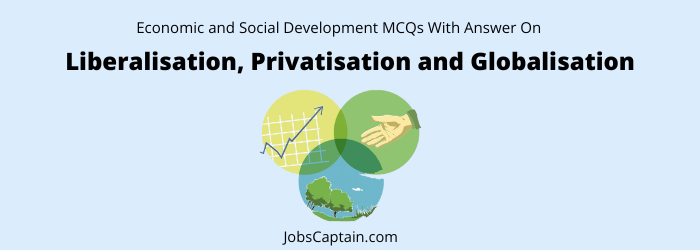
This Liberalisation, Privatisation and Globalisation MCQ Quiz tests your knowledge on the important topics covered in the subject. The quiz has been designed to test your understanding of the process of liberalisation, privatisation and globalisation and their impact on business.
| Return To | Economic and Social Development MCQ | |
Question 1: Who is called the pioneer of liberalisation of Indian Economy?
(A) Dr. Manmohan Singh
(B) P.V. Narsimha Rao
(C) Dr. Bimal Jalan
(D) P. Chidambaram
Question 2: Read the following statements carefully
- In 1991, policy of Economic liberalisation was adopted in India.
- Foreign currency market and foreign investment sectors were promoted.
- Import of foreign goods was freed from prohibition.
Select the answer on the basis of following codes.
(A) 1, 2 and 3 are correct
(B) 1 and 2 are correct
(C) 1 and 3 are correct
(D) 2 and 3 are correct
Question 3: Promotion given to Multinational companies in India means encouragement of __________.
(A) Privatisation policy
(B) Globalisation policy
(C) Liberalisation policy
(D) All of the above
Question 4: Rangrajan committee was constituted for ___________.
(A) Disinvestment
(B) Banking reforms
(C) Tax reforms
(D) Foreign Trade
Question 5: The first phase of liberalisation was initiated in India under the regime of ___________.
(A) Rajiv Gandhi
(B) P.V. Narsimha Rao
(C) Atal Behari Vajpayee
(D) H.D. Dev Gowda
Question 6: Globalisation does not include __________.
(A) Reduction in import duties
(B) Abolition of import licensing
(C) Free flow of foreign Direct Investment
(D) Disinvestment of Public Sector equity
Question 7: Free Trade Policy refers to a policy where there is ____________.
(A) absence of tariff
(B) restriction on the movement of goods
(C) existence of anti-dumping policy
(D) encouragement for balanced growth
Question 8: The first Export Processing Zone of the Private Sector was established at ___________.
(A) Surat
(B) Noida
(C) Chennai
(D) Mangalore
Question 9: Free trade zone is one __________.
(A) where trade’s done without restrictions
(B) where any entrepreneur is free to start industries
(C) where infrastructure facilities are provided free to entrepreneurs by the government
(D) where industries are free from excise duties and produce for exports
Question 10: Which of the following is not part of the ‘Second-generation of Reforms’ identified by the government?
(A) Oil Sector Reforms
(B) Public Sector Reforms
(C) Legal System Reforms
(D) Reform of Government & Public Institutions
Question 11: Why companies go for business process re-engineering with the help of technology?
(A) Customers demand and expectations
(B) IT being leveraged to provide competitive edge in products and services at lower costs
(C) The pace of change has accelerated with the liberalisation of economies world over
(D) All of the above
Question 12:
- Assertion (A): Many industries in India have obtained ISO 9001 and ISO 9002 certification in the recent past.
- Reason (R): There has been considerable liberalisation in the licensing policy of the Government of India.
In the context of the above given statements, select the correct answer from the codes given below.
(A) Both (A) and (R) are true and (R) is the correct explanation of (A)
(B) Both (A) and (R) are true,but (R) is not the correct explanation of (A)
(C) (A) is true, but (R) is false
(D) (A) is false, but (R) is true
| Return To | Economic and Social Development MCQ | |
